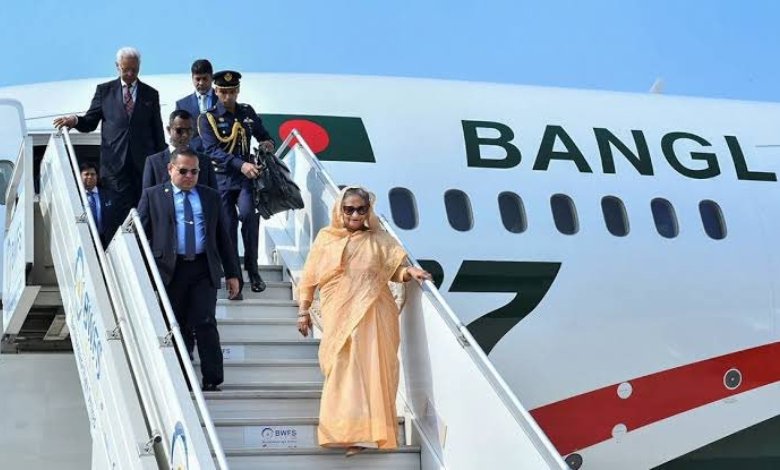Bangladesh in Crisis: The Fallout of Sheikh Hasina’s Resignation
A Nation in Turmoil: The Aftermath of Sheikh Hasina's Departure and the Path Forward for Bangladesh

Bangladesh Faces Uncertainty and Upheaval as Longtime Leader Resigns Amid Mass Protests and Economic Struggles
Bangladesh is grappling with a significant political crisis following the sudden resignation and flight of Prime Minister Sheikh Hasina. This event has triggered widespread unrest, property destruction, and loss of life, drawing international scrutiny and raising concerns about the region’s stability. This report examines the causes, events, and implications of this turbulent period.
The Dramatic Exit of Sheikh Hasina
Sheikh Hasina, Prime Minister of Bangladesh since 2009, resigned and fled the country as protests against her government intensified. Her official residence, Gano Bhaban, and various government facilities were overtaken by enraged citizens. Unconfirmed reports suggest she may have sought refuge in India, prompting the Indian Border Security Force (BSF) to heighten security along the border.
Unrest and Destruction
The unrest reached a peak when protesters set fire to the Awami League headquarters in Dhaka. Chants of “Shame on you, Hasina” filled the streets, encapsulating the public’s anger. Statues of Sheikh Mujibur Rahman, the country’s founder and Hasina’s father, were destroyed, reflecting deep discontent with both the current administration and its historical legacy. Public sentiment has drastically shifted, viewing Mujibur Rahman not as a hero, but as a symbol of ongoing tyranny.
Underlying Causes of the Crisis
Prolonged Rule and Centralization of Power: Hasina’s 15-year rule and her centralization of power led to growing resentment. Accusations of authoritarianism and fascist policies exacerbated public anger.
Economic Struggles: Rising inflation, with rates between 17-20%, has made daily life unbearable for many. The economic hardships have amplified public frustration, questioning the government’s handling of the economy.
Controversial Reservation Policy: The reinstated 30% job reservation for families of freedom fighters from the 1971 independence war became a focal point of protests. Originally intended to honor sacrifices, it now faces opposition, particularly from the youth, who demand its abolition.
Violent Repression: The government’s harsh crackdown on protesters, including student and police casualties, intensified demands for Hasina’s resignation. Reports suggest around 1,000 deaths due to police action, with students claiming hundreds of their peers were killed.
Generation Z’s Role
The protests were largely driven by Generation Z, whose political consciousness and demand for democratic governance are on the rise. Their opposition to the reservation policy and dissatisfaction with overall governance have catalyzed a movement beyond economic grievances.
International Reactions and Regional Implications
India: The crisis presents a challenge for India, with its close historical and cultural ties to Bangladesh. West Bengal Chief Minister Mamata Banerjee has called for peace and cooperation. The BSF’s heightened alert along the border highlights potential security concerns.
China: China’s strategic interests in Bangladesh, including the Teesta River project, add complexity. Geopolitical tensions between India and China are likely to influence responses to the crisis. Hasina’s recent visit to Beijing and her abrupt return home underscore the intricate geopolitical landscape.
Looking Ahead
Bangladesh faces an uncertain future, with the potential formation of an interim government and a need for significant political reforms. Addressing economic disparities and fostering democratic institutions are crucial for long-term stability.
Interim Government: Army Chief General Waqar Uj Zaman announced the formation of an interim government following Hasina’s resignation. However, protesters reject military rule, demanding a democratic government instead.
Economic Reforms: The new government must address economic grievances that fueled the protests, implementing policies to combat inflation and promote equitable growth.
Democratic Reforms: The demand for democratic governance is central to the protests. Ensuring free and fair elections will be key to hearing the voices of youth and the broader public.
Comparative Analysis
While similar to Sri Lanka’s recent upheaval over economic issues, Bangladesh’s crisis is fueled by a combination of economic grievances, historical discontent, and violent repression, presenting unique challenges.
Social and Cultural Implications
The destruction of Mujibur Rahman’s statues indicates a significant shift in public sentiment, suggesting a reevaluation of national identity and historical narratives.
The Role of the International Community
The international community, especially neighboring India, must support efforts to restore peace and democracy in Bangladesh through diplomatic engagement, economic support, and mediation.
Diplomatic Engagement: India’s diplomatic efforts will be vital, given its historical ties and strategic interests.
Economic Support: International financial institutions and neighboring countries should provide economic assistance to stabilize Bangladesh’s economy.
Mediation: Mediating between the government and protest leaders can facilitate a peaceful transition, ensuring the representation of youth and the broader public in any new government.
Conclusion
The political crisis in Bangladesh stems from prolonged authoritarian rule, economic mismanagement, and repressive policies. The public’s demand for democratic governance and economic justice has led to unprecedented unrest, with significant regional and international implications. Addressing economic disparities, fostering democratic institutions, and hearing the younger generation’s voices are crucial steps towards restoring stability.







